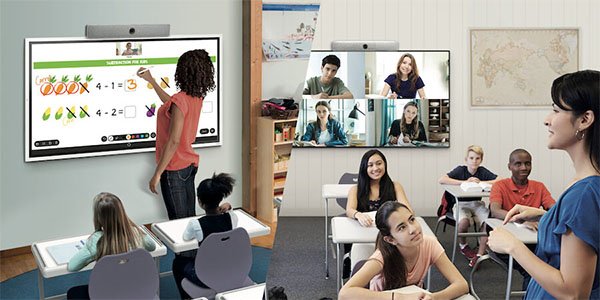With the application of new technologies such as artificial intelligence, big data, and cloud computing, smart boards have broad prospects for development and will be widely used in various fields in the future.

In the field of education, the smart board will promote the digitization and personalization of teaching content, and combine with AI and big data technology to realize intelligent teaching and independent learning. At the same time, the smart board will also promote the development of online distance education, making high-quality educational resources cover a wider range.

In the medical field, the smart board will be used in the communication between doctors and patients to explain cases; it can also be combined with medical imaging AI technology to assist doctors in film reading; with the telemedicine system, it can realize remote consultation of high-level experts.
In the commercial field, smart boards can be applied to smart conference systems and new retail solutions to create an immersive shopping experience. In industrial manufacturing, an intelligent command and dispatch system can be built to optimize the production process.
Overall, the smart board is developing towards higher definition, larger size, and smarter interconnection. With its powerful human-computer interaction and rich application scalability, the smart board will surely become one of the key technologies for the intelligent transformation of education, medical care, business and other fields.

1. Combination With VR/AR Technology
VR virtual reality and AR augmented reality technology will make the content presented by the smart board more immersive and interactive, creating an immersive environment for users.
2. Combination With Natural Language Processing Technology
The smart board has the ability of speech recognition and understanding, and can carry out speech interaction and realize contactless control.
3. Combination With Artificial Intelligence
Artificial intelligence can independently optimize the operation interface according to user habits to achieve a personalized user experience.
4. Development Towards Foldable
In the future, smart boards may use flexible screen technology to realize foldable and portable applications and expand mobile application scenarios.
5. Integration With Cloud Platform
The cloud platform can realize multi-terminal data synchronization sharing, remote collaboration, and richer content.
6. Shift To Customization
The software and hardware of the smart board will change to an open platform, and users can freely combine modules and customize personalized solutions.
7. The Scope Of Application Continues To Expand
From education and medical care to industrial manufacturing, to smart retail, smart home, etc., the application fields of smart boards will continue to expand.
8. Continuous Optimization Of User Experience
The operation interface is simpler and more responsive, and with touch stylus and voice interaction, it will provide a better user experience. In a nutshell, with technological innovation and application extension, the development of smart boards still has broad room for imagination.
continue reading




